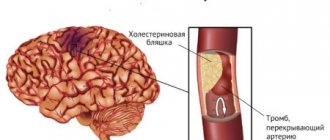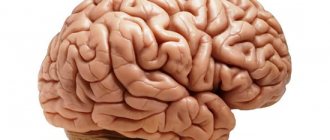Home / Children / Kids
Back
Published: 03/04/2021
7
1858
Night sleep is important for every person. This is especially true for children, because the growing body is developing and the nervous system is being formed. Violations affect health, so parents worry if their child often wakes up at night, sleeps restlessly, or shudders. A child twitches in his sleep – is it normal or pathological?
- 1 Psychological features of deviations at different ages
- 2 Effect of sleep stages
- 3 Common causes of restless sleep in children
- 4 Instructions for parents 4.1 When not to worry
- 4.2 You can’t do without the help of a specialist
- 5.1 Compliance with healthy sleep rules
Psychological features of deviations at different ages
Different age groups are characterized by their own characteristics in the development and manifestation of mental processes. They, in turn, leave an imprint on children’s activities and nighttime rest. Until 2-3 years of age, they are especially attached to their mother; if at this time there is no contact or there is not enough maternal affection and attention, then this is all reflected in behavior, the psyche suffers, which affects the quality of night's rest.
After falling asleep, the child twitches, wakes up in the middle of the night, some even cry. Starting from the age of 4-5 years, development is very active, any stressful situations will negatively affect the psyche. If there are problems in a child care facility or at home in the family, psychologists note stuttering in children and the appearance of nightmares; it is not surprising that the child shudders in his sleep and wakes up.
Neurologists often diagnose this age group with hyperactivity. If it is present, for example, at the age of 6, one can suspect that in the first grade it will be difficult for a child to sit still for a long time, grasp the material, and problems will arise in his studies.
Further, everything grows like a snowball: parents scold, the growing personality becomes nervous, mental disorders appear, which lead to deviations during the night's rest, including shuddering.
At the age of 7-8, a little person already strives to assert himself in a team among his peers; if this does not work out, then real communication is replaced by virtual communication; mental disorders do not disappear from this, but accumulate even more. Radiation from a computer has far from a positive effect on the developing brain, which can even provoke seizures, especially in status epilepticus.
A teenager may shudder in his sleep due to the development of neuroses and the appearance of fears resulting from psychological problems. And at this age they can be expected both at school and at home.
Why does a newborn shake in his sleep?
› From birth to 1 year ›
Young mothers are extremely attentive to their babies, but after discharge from the maternity hospital, it turns out that most of the questions in the maternity hospital were left unasked. One of them is why a newborn shudders in his sleep. We'll tell you what the reasons are and what needs to be done.
Why does a child startle in his sleep?
All babies wince when they sleep. This happens when the active phase of sleep is replaced by a deep one. Babies sleep differently than adults.
We first fall into deep sleep, and only then enter a short phase of dreams, but month-old newborns are the opposite: for the first 30 minutes they see something in their dreams, and then they go into deep sleep.
At the moment of transition, the child may shudder and, normally, continue to sleep.
If a 1-3 month old newborn throws up his arms (and possibly screams) when he starts, this is also a variant of the norm. This is how the Moro reflex manifests itself - a protective reaction of newborns to fear or loss of balance.
This is how a child may flinch if he heard a loud unfamiliar sound, his position changed abruptly, or he dreamed about something. In 4-6 month old children this reflex fades.
1-3 month old or 4-8 month old newborns who are experiencing pain due to colic or teething may flinch periodically.
The same reaction can be caused by any discomfort: uncomfortable position, cold or heat, stuffiness.
One of the newest hypotheses for why babies may flinch: this is how a child learns to control his own body. Sleep is a time when the brain processes data received while awake, and shaking is a harmless side effect.
When is it abnormal to flinch? If these movements are convulsive in nature, accompany the entire sleep of the newborn, or the child does not cry out just once, but cries for a long time after trembling, this is a reason to consult a specialist.
The reasons may be:
Syndrome of increased neuro-reflex excitability (HRE)
– a disorder of the central nervous system. As a rule, the cause of this condition is birth trauma, hypoxia during childbirth or during pregnancy. This condition requires, at a minimum, observation by a neurologist.
Lack or excess of a number of minerals
– feeding error, inconsistency of the food eaten with the physical needs of the child. During active movement, many macro- or microelements are consumed.
If the baby is too active or, on the contrary, too calm, an imbalance may occur.
In both cases, spasms that a 3-4 month old baby normally experiences may intensify, or convulsions may occur - a pathology at any age.
Vitamin deficiency
D.
A common cause of a combination of excessive sleepiness and anxiety. Sometimes it manifests itself as insomnia. These signs appear even before rickets occurs. It is important to remember: excess vitamin D causes exactly the same neurological symptoms as its deficiency. This is why it is forbidden to experiment with the dose of this drug without consulting a doctor.
Increased intracranial pressure
- an extremely dangerous condition that requires observation by a neurologist, and possibly hospitalization. Its first manifestations are increased anxiety, the baby begins to shudder in series.
If the baby begins to shudder more often against a background of high temperature, this is an ominous sign that requires emergency medical care. Call an ambulance immediately: such convulsive movements can develop into full-fledged convulsions!
What to do if your newborn baby starts in his sleep?
The algorithm of actions for parents is as follows.
- Make sure that your newborn does not startle more often than usual and that his or her movement patterns have not changed.
- If you think that something is wrong, record how the child shudders on video and seek medical help, the speed of treatment depends on the general condition of the child.
- Measure your baby's temperature; if it is elevated, give the antipyretic recommended by your pediatrician.
- Ensure hygiene: ventilate the room, darken it, cover the baby or vice versa, remove unnecessary things.
- Darken the room; bright lights disturb babies' sleep just as much as adults.
- Eliminate sharp noises: a quiet conversation, the noise of a washing machine or the rustle of keys is not a hindrance for a newborn, but an unexpected loud sound can cause a start.
You should not hesitate to call an ambulance or emergency help if:
In any unclear situation, it is better to call a doctor. Pediatricians understand the fact that parents do not know the reasons for changes in the child’s behavior, and without understanding, a condition can be dangerous to the health and even the life of the baby.
What do leading experts advise if your newborn starts in his sleep?
Well-known pediatrician and TV presenter Evgeny Komarovsky believes that children often start to flinch due to poor hygiene in most cases. If a child (and not just parents!) is concerned about this, the doctor recommends paying attention to the following factors:
- the temperature in the room should be 19-20 degrees, otherwise anxiety may be associated with overheating or hypothermia;
- Too little time has passed after feeding, and the baby is worried about the desire to burp;
- the newborn is stuffy: you need to ventilate the room and remove diapers from the sides of the bed;
- The baby hasn’t had time to get tired and sleep, in fact, he doesn’t want to, which is why he wakes up at the slightest movement.
Pediatrician Ali Mohamed Gamal Eldin Monsour generally agrees with his Ukrainian colleague and in addition recommends swaddling a 1-2 month old newborn or putting him to sleep not in pajamas, but in a sleeping bag, so that the baby, when waking up, is not frightened by additional raised arms.
There are two options for parents to react to the fact that a child may startle when he sleeps. One is not to worry.
Another is to make an unscheduled appointment with a pediatrician or directly with a neurologist, or call an ambulance.
But if, even after reading our material, you are not sure what the cause of the shuddering is and whether the child needs help, catch the moment when he shudders on video and show the recording to the doctor.
Victoria Vasilievna Kiseleva,
child hygiene doctor
Source: https://RodaRadi.ru/ot-rozhdeniya-do-goda/pochemu-novorozhdennyj-vzdragivaet-vo-sne/
The influence of sleep phases
During the night, a person's sleep goes through several phases that replace each other. Each is characterized by its own characteristics. Fast and superficial after a while gives way to deep and slow. It is during this phase that a person sleeps soundly, which cannot be said about external manifestations: the child can not only twitch, but also sob, talk, and even gesticulate.
During the fast phase, you have dreams that can be quite emotional. This provokes twitching, the muscles contract, causing movements of the legs and arms.
Young children may not yet feel the urge to go to the toilet at night, and involuntary urination occurs, accompanied by startling.
A deep immersion in the kingdom of Morpheus is characterized by the appearance, even normally, of hypnagogic convulsions, and in childhood they are more pronounced, which can worry parents if twitching of the head or limbs is observed at night.
Gradually, with age, the fast phase shortens, and waking up after a start disappears.
Most often, twitching in children's sleep is associated with the development of their nervous system. As a rule, by the age of 10, all processes are normalized, including sleep.
Possible physical and psychological abnormalities
The main physiological causes of nighttime shuddering in babies:
- Violation of metabolic processes;
- Calcium deficiency;
- High intracranial pressure;
- Neurological disorder (syndrome of increased neuro-reflex excitability).
During the period of active bone tissue growth, the child experiences a huge physiological need for calcium. If calcium levels in the blood decrease, sleep tends to be shallow. This is why children sleep worse during all periods of active growth.
In the autumn-spring season, parents, citing concern for their child, independently “prescribe” vitamins for them. All specialized vitamin complexes for children are oversaturated with vitamin D. In addition, in the spring the first sun appears and, playing outside, boys and girls receive an additional portion of vitamin D.
Few people know that this vitamin greatly increases the baby’s need for calcium. If you do not provide it to them, the child develops calcium deficiency and has a lot of problems with the depth of sleep.
In advanced cases, a lack of calcium can result in rickets, a disease that causes skeletal deformation and problems with the nervous system.
Startles can also be caused by transitions between sleep stages. When falling asleep, anyone can startle: this condition is called hypnagogic fear. This sensation can occur in both adults and children: a person feels a fall and involuntarily shudders.
Common causes of restless sleep in children
If a child shudders in his sleep, the reasons may be different, but among them the following can be noted:
- Disorders of metabolic processes in the children's body. A fully immature nervous system cannot yet fully control metabolic reactions. There may be discrepancies between calories taken in and calories burned. Gradually, this leads to the development of other pathologies, accompanied by cramps and muscle spasms.
- Children's gastrointestinal tract is not fully formed, so errors in nutrition will certainly affect their health, mental processes and quality of sleep.
- Calcium deficiency is another cause of possible twitching. The trace element is important for the development of the musculoskeletal system; when problems arise, the nervous system suffers.
- In children, neurologists often note increased intracranial pressure. This pathology disrupts night rest, the child may wake up with a headache.
- Violation of the daily routine. Parents themselves are often to blame for this. If a child goes to bed whenever he wants, watches TV before bed, and plays noisy games, then it is not surprising that at night he may cry, shudder or laugh.
- With some pathologies of the nervous system, children may experience a syndrome of increased neuro-reflex excitability. If left untreated, this deviation leads to psychological problems, studies suffer, and uncontrolled movements appear both day and night.
- It is important for young children to feel protected and loved. If this sensation is not present, then it is not far from the development of neuroses and mental disorders. As a result, the child may become frightened and sob.
- A child may wave his hand or wake up several times due to severe emotional stress. Any conflicts in the family between parents, at school with teachers or peers traumatize the child’s psyche.
If a child twitches when falling asleep and during sleep only occasionally, then there is no reason to worry; if this is observed constantly, then a consultation with a neurologist and psychologist is needed.
A newborn baby shakes in his sleep - All about pregnancy
- Newborn shudders in his sleep: 7 possible reasons, 28 doctor’s recommendations for parents
- 1. REM sleep phase
- 2. Moro reflex
- 3. Pain
- 4. Noise
- 5. Temperature
- 6. Uncomfortable posture
- 7. Feeling insecure
- Why does the child flinch? Pathological causes
- A newborn's chin, arms, legs are shaking - what is it and how to treat it?
- Why does a newborn shake: reasons for twitching of different parts of the baby’s body
- When and how a newborn’s body can shake: symptoms of tremor of the chin, limbs, lower lip
- What manifestations of tremor in a baby require treatment - dangerous symptoms
- How to treat tremor in children?
- What to do if a newborn’s chin, lip, legs, arms are shaking: expert opinions
- Why does a newborn shudder in his sleep: normal or pathological?
- What does the famous children's doctor Evgeniy Komarovsky think about this?
- Why does a newborn startle in his sleep?
- Painful condition of the child
- Emotional stress
- Violation of the daily routine
- What parents need to pay attention to if the child shudders or sleeps poorly
- What should you do if your newborn baby starts to shudder in his sleep?
- What is it like to sleep like a baby?
- It's normal to startle in your sleep
- So why is this happening to your child?
- What to do as parents: instructions
- A newborn shudders in his sleep: why and what to do?
- Sleeps like a baby
- Sleep, our baby, sleep, our baby...
- Have a good night's sleep!
- What is the importance of the toddler’s calmness and serenity in his sleep?
- Differences between the sleep of a baby and his parents
- Causes of flinching
- Anxiety pills
Article last updated: 04/25/2018
The common phrase “sleeps like a baby” conjures up images of a peacefully sleeping newborn for many parents. However, babies twitch, make gurgling sounds, stop breathing, move their arms and scream in their sleep. This behavior is normal, and the twitching is most likely a result of REM sleep or the spontaneous Moro reflex.
A twitch is a sudden, involuntary movement that occurs at any time, including when a child is deeply asleep.
REM sleep phase
What happens if a newborn baby starts in his sleep? Babies dream just like adults, which means they also experience REM, or rapid eye movement, sleep during their dream cycle.
During REM sleep, the newborn's face will tremble. He will also likely breathe irregularly, snort, whimper, and flail his arms and legs. Don't worry, REM sleep gets shorter as babies get older.
According to research, the order will change in about 2 to 3 months. As your baby gets older, he will go through other stages of sleep before entering REM sleep. As the child gets older, the amount of REM sleep decreases and sleep becomes restful. By age 3, children spend a third of the night in slow-wave sleep.
The reason for consultation with a specialist is a situation when the baby wakes up more than 10 times and looks scared.
Moro reflex
The Moro reflex is another reason why newborns startle in their sleep. Babies are born with a set of reflexes, but this is the most alarming manifestation for new parents. When a baby starts in his sleep or feels like he is falling, he will throw his arms out to the side with a sudden jerk and perhaps scream.
Like many other reflexes, the Moro reflex is a built-in survival mechanism designed to protect a vulnerable newborn. And this is a primitive attempt to restore a noticeable loss of balance. Again, don't worry if you see your baby suddenly startling and throwing up his arms while sleeping.
Pain
With colic or teething, the child twitches in his sleep due to periodic pain.
Noise
This is another factor why a newborn twitches in his sleep. A loud sound can scare and wake up a baby.
But you don’t need to maintain absolute silence for your baby to sleep. There are sounds that are familiar to a baby - rustling sounds, the hum of a washing machine, the quiet voice of mom or dad, the sound of water, and others.
Sometimes there is a sharp sound of a siren or the sound of a falling object coming from the street. Such a noise is unusual and new for the baby, because of this the baby shudders sharply. Even after some time, when the fear seems to be forgotten, the child shudders in his sleep due to excitement of the nervous system.
Temperature
During sleep, the baby twitches and tosses and turns when he feels stuffy. Stuffy or musty air in the bedroom is irritating to the baby and causes discomfort.
Uncomfortable position
It is likely that the baby is not comfortable sleeping in the position in which his parents put him. The baby shudders and begins to spin around in search of a comfortable position.
Feeling insecure
Some pediatric doctors have given the name “4th trimester of pregnancy” to the first three-month stage of a baby’s life and advise recreating conditions for the baby that maximally imitate those in the womb. This will give the baby a feeling of protection and deep sleep.
The sleep jerking described above is normal and does not require treatment.
However, there are times when a child shudders in his sleep due to various diseases.
Why does the child flinch? Pathological causes
Convulsive rhythmic movements of the baby that continue throughout sleep, combined with screaming and crying, are signs of health problems. Parents who discover these manifestations should take their baby to the doctor as soon as possible.
- Metabolic disorder. The baby's central nervous system is gradually stabilizing, so it is still difficult for his body to carry out certain metabolic processes.
Remember that a possible discrepancy between the amount of food and the child’s physical activity leads to metabolic disorders, which causes a shortage or, conversely, an excess of certain elements. All this leads to diseases, the symptoms of which are cramps and muscle spasms. This could be spasmophilia or anemia. - Lack of calcium. When a baby does not eat properly and the body lacks calcium and vitamin D, rickets develops, a disease that causes changes in skeletal structures. Externally, the body seems to be distorted. Problems with the functioning of the nervous system may occur.
- High intracranial pressure. Sleep disturbance is one of the symptoms of increased intracranial pressure. This pathology can occur as a result of trauma at birth. Brain cancer may also be the cause.
- Syndrome of increased neuro-reflex excitability (HRNRS) is the result of a disruption of the central nervous system. For this reason, the infant often shudders. This diagnosis is most often made to children with birth trauma.
If the disease is not detected in a timely manner, this will lead to inattention, restlessness, and sloppiness in the child in the future. Memory lapses are also possible.
- Ventilate the bedroom every day before putting your baby to bed;
- even in severe frost in the nursery, open the window for 5 - 10 minutes;
- Install a thermometer in the bedroom and monitor the temperature. It should not exceed 18-21° C;
- do not wrap the baby up. Dress your child in high-quality, warm pajamas made from natural fabric, rather than covering him with several blankets;
- the crib must be placed as far as possible from the radiator and heaters;
- experiment by placing the baby on its side or back to choose the most comfortable position;
- Change the baby's sleeping position every three hours if he has not done this himself. For example, turn your head in the other direction;
- remove everything unnecessary from the bed;
- dose activity while awake. 1.5 - 2 hours before going to bed, proceed to quiet activities;
- Give your baby a relaxing bath before bed;
- give a soft massage. This will help the child relax;
- In the children's bedroom, when going to bed, eliminate extraneous movements and loud conversations. A quiet environment will help the baby fall asleep faster;
- swaddling your baby at night will recreate his intrauterine sensations;
- You can use a special zippered cover. In it, the baby will not twitch his arms and will not frighten himself.
Weak and short-term twitching at night is not dangerous; this is considered normal behavior for infants. Experts argue that the baby’s brain structures are still immature and excitation mechanisms predominate over inhibitory reactions. Therefore, parents should not panic. They need to provide the most comfortable conditions for the baby to sleep soundly.
If the baby’s sleep anxiety persists even after providing comfortable conditions - the child sleeps poorly and constantly wakes up, you should consult a doctor. If there is a disease, the necessary measures will be prescribed.
Thus, infants may have prolonged dreams and exhibit bizarre reflexes during sleep. Babies make a lot of strange noises while they sleep. They will gurgle, pant rapidly, stop breathing for as long as 10 seconds, whimper, scream, whistle, and make rattling noises if their nose is blocked. This is completely normal.
Article rating:
(15,00
Source: https://momchild.ru/novorozhdennyj-rebenok-vo-sne-tryasetsya.html
Instructions for parents
If twitching and slight tremor of the limbs are observed at night, this does not always mean serious neurological problems. But parents need to know when to sound the alarm.
When you don't have to worry
The absence of pathology can be confirmed if shaking of arms and legs is observed occasionally, and parents can explain them for the following reasons:
- A hectic time spent before bed.
- Errors in nutrition.
- Emotional overstrain.
- Some somatic problems, for example, a child has a stomach ache.
- Molars are being cut.
- Muscle spasm occurs during night urination.
If the mother notices a pattern between nightly muscle contractions and the listed factors, then there is no cause for concern. It is only important to eliminate them so that everything returns to normal.
You can’t do without the help of a specialist
More serious pathologies that require urgent medical attention can also provoke night shudders. Parents should worry if:
- The child jerks his head with difficulty, shudders, but also wakes up, crying and screaming a lot. This has been observed for several nights in a row.
- When not ordinary shudders appear, but trembling. This is more reminiscent of convulsions and cannot be ignored.
- Cannot calm down for a long time if woke up at night.
It is better to visit a doctor and be on the safe side than to miss the onset of the development of a serious pathology, for example, epilepsy or other disorders of the nervous system.
Neurology has in its arsenal medicines that will help get rid of problems and improve the quality of rest at night, but also the overall development of the body.
A child twitches with his whole body, arms and legs in his sleep: reasons, what to do
Young mothers and fathers often do not know why a child may twitch in his sleep. There are physiological reasons that should not cause alarm. They will not affect the baby's health.
It happens that infants begin to twitch their arms and legs in the presence of neurological disorders.
To exclude the development of pathologies, you need to carefully monitor the baby, create comfortable conditions for sleep and, if alarming symptoms are detected, consult a doctor.
Baby
Peculiarities of sleep in children under one year old
Children under one year old sleep is mostly superficial. It constantly moves from the fast phase to the deep phase. At the same time, the baby can open his eyes slightly. If he feels discomfort, for example, he is cold, hot or wet, he will finally wake up and report his dissatisfaction to adults.
A baby needs REM sleep to learn new information and relieve nervous tension accumulated during the day. If your baby sleeps healthy and is steadily gaining weight, then there is no need to worry about his condition.
Newborn babies sleep about 20 hours a day. They need this to grow and develop. They wake up to eat and change clothes. Gradually, as the year progresses, the duration and number of daytime sleeps decrease. At 11-12 months, infants rest mainly at night.
Why does a child twitch when falling asleep?
The fact that a child twitches in his sleep often frightens young parents. Doctors usually confirm that this is no cause for concern.
Why does a baby cry when he wakes up?
Infants often shudder when falling asleep. This usually confirms that the baby had an emotional day. For him, everything in the world is new; the baby does not always have time to absorb information and consolidate skills. Therefore, the task of parents is not to overload the baby’s nervous system, especially in the evening. This applies not only to unpleasant events and impressions, but also to joyful ones.
Note! A child's sleep may be affected by worries that his mother left for a long time during the day, and he was left with his grandmother, or that his favorite toy or blanket was taken away. It is necessary to be attentive to the needs of the child so that he feels loved.
When a baby falls asleep, its muscles relax. When they contract, a feeling of falling occurs. Therefore, the baby may get scared and twitch. This is a natural process.
If your child moves suddenly 30-40 minutes after he goes to bed, he is most likely fast asleep. Due to the imperfection of the nervous system, the transition between sleep phases is very noticeable. The following signs will confirm a change in sleep phases:
- The child stops tossing and turning;
- Breathing becomes slow and calm;
- Eye movements are no longer visible under the eyelids.
When a baby just falls asleep, he reacts sensitively to external stimuli. So, any sharp sound or pop can lead to twitching. You should not maintain complete silence when running out of the room where the child is sleeping; you can walk next to his crib and talk.
Happy parents at the baby's crib
Note! The main thing is not to change the timbre or increase the volume. For example, a dog barking or screaming can frighten a baby, as they will stand out from the series of monotonous sounds.
Such reasons are recognized as physiological and are explained by the fact that the baby gets used to the world around him. Soon he and his nervous system will get stronger, and such manifestations will become less noticeable or disappear altogether.
Baby twitches in his sleep
Why does a newborn baby hiccup and spit up after feeding?
If a child twitches in his sleep, it is usually caused by the following reasons:
- The baby is teething. From sharp pain, especially when incisors are expected, the child may move;
- The baby was overtired and went to bed too late, which affects the quality of his rest. In this case, he will sleep restlessly almost all night, he may even cry and wake up in tears;
- The baby went to the toilet or feels the urge to do so. If the diaper is warm, then this is exactly the reason;
- The concern is colic, which begins at the age of 2-3 weeks and lasts up to 4 months. Some babies suffer from increased gas formation for up to six months. At the same time, the child jerks his legs in his sleep, presses them to his stomach, and tosses and turns. Typically, colic occurs at night and in the evening. During the day the baby sleeps soundly and sweetly.
Baby sleeps sweetly
Children have different opinions about dreams. Some believe that they come to children after three years of age. Other experts believe that babies dream while still in the womb. Then the twitching can be explained as a reaction to color or black and white pictures that infants view while resting. The main thing is that there are no more than 10 such sudden movements.
Parents' actions
When a child says "mama"
Mom and dad should always be close to the baby, surround him with love and care.
Note! If the baby twitches and continues to sleep, then you should not wake him up. It is enough to pet him and sit next to him for a while, observing his behavior.
If a baby has a fever, then most likely he has started having convulsions. At this moment, there is no need to shake the child or try to sit him down. The main thing is not to panic, so that the excitement is not transferred to the little person, act calmly and confidently:
- Place the child on his side;
- Make sure he doesn't injure himself;
- Call an ambulance, especially if this is the first time such an incident has occurred. Medical professionals will tell you how to act in such a situation, because perhaps the seizures will recur if the body temperature rises.
It is advisable to consult a neurologist to exclude the development of pathologies. Children usually outgrow them, and such a reaction to a temperature jump disappears.
Alarming symptoms
Usually the child twitches when changing phases of sleep. There is nothing dangerous in this; this is also typical for adults. There are signs that should alert parents:
- The baby sleeps restlessly all night, the child twitches his arms and legs even during daytime sleep;
- During rest, the baby sweats a lot. Does not show activity during the day, looks lethargic;
- During sleep, there are more than ten startles. In this case, trembling appears in the arm or leg;
- During the day, the baby is restless, his chin or head shakes when he lies on his stomach. After reaching 3 months, children should not experience such a symptom. Before this, it is considered acceptable;
- The twitchings come one after the other, then after a short interval they are repeated again.
If at least one of the listed signs is noticed, you should immediately contact your pediatrician. If necessary, he will refer you to a specialist - a neurologist.
Baby at the neurologist
Creating comfortable sleeping conditions
Young parents should take care of healthy children's sleep by creating the necessary conditions for it:
- Ventilate the room in the evening. It is better when a child sleeps in a cool place, but warmly dressed, than in a stuffy and naked place;
- Carry out wet cleaning every day, get rid of dust, wash the floors;
- Buy your baby an anatomical mattress of a certain hardness, suitable specifically for babies;
- Do not wrap the baby up and make sure he doesn’t freeze;
- Change diapers in a timely manner;
- Feed before bedtime; babies fall asleep much faster on a full stomach;
- Maintain the optimal temperature in the room. Children are comfortable when it does not exceed 22 degrees.
In order not to overload the child’s nervous system, you should not plan noisy events for the evening. It is also good to arrange new acquaintances and exciting events in the morning, before lunch. Quiet games and activities are preferable before bedtime.
Rituals that help you relax and fall asleep are welcome. Repeated actions calm the baby. He already knows what awaits him next and understands that he is safe.
The absence of anxiety has a beneficial effect on the quality of sleep.
Note! Also, no matter how small the child is, he feels the mood of his parents. If there is discord in the family, mom and dad are constantly on edge, then the baby will not leave worry. This is reflected in his rest.
If your baby twitches in his sleep, you need to pay attention to the nature and frequency of his movements and be sure to check his temperature. So he can wave his arms and legs or move his shoulders slightly.
Sometimes twitching occurs in series, but usually it happens once. In any case, you need to be close to the baby so that he feels love and care.
If his anxiety increases and other symptoms appear, visit a pediatrician.
Source: https://kpoxa.info/zdorovie-pitanie/rebenok-dergaetsya-vo-sne-zasypaet.html
Recommendations for normalizing night sleep
Both a child and an adult may shudder; if there are frequent awakenings at night, we can recommend that parents try to create comfortable conditions for night rest. Required:
- Eliminate stress from your child's life.
- Choose comfortable pajamas.
- Before going to bed, you can take a relaxing bath with decoctions of medicinal herbs, for example, chamomile, valerian.
- If the child cannot fall asleep quickly, then you can read a fairy tale or turn on a lullaby. Teenagers should avoid gadgets and watching action films at least an hour before bedtime.
- A small child who is shuddering or sobbing can be petted so that he calms down and feels the warmth of his mother’s hands, but you should not wake him up.
If the measures taken do not help correct the situation, then you should seek help from a specialist.
Following healthy sleep rules
Even in the absence of neurological or psychological problems, it is important to follow some rules to ensure restful sleep. Recommendations can be given as follows:
- Eliminate sharp sounds and noise. Silence in the nursery is important for sound sleep.
- It is important to maintain the temperature in the room. Your child will sleep better if the temperature is maintained within 20-22 degrees. Ventilate the room every day and do not forget about wet cleaning.
- For sound sleep, it is important to choose the right position. Young children often prefer to sleep on their stomachs. Growing up, the child himself will choose a comfortable position for falling asleep.
In what cases is it necessary to consult a doctor?
Isolated shudders caused by sharp sounds or a terrible dream do not pose any danger.
However, if the list of symptoms includes hysterical crying, deterioration in health, loss of appetite and poor sleep, you should consult a specialist. Consultation with a doctor is required if:
- The child constantly shudders when he sleeps, even in the obvious absence of stimuli: sounds, light, physiological discomfort (wet diaper, hunger, overexcitement);
- The baby wakes up more than 8-10 times a night;
- If your son or daughter cries continuously after waking up and does not calm down even after rocking or feeding.
Another significant reason to get examined by a doctor is the rhythmic nature of the shudders. This means the baby is having seizures. They are similar to shuddering from the cold: sometimes the whole body trembles, sometimes a separate part. Night cramps may be a sign of epilepsy or another neurological disease.
After a personal examination, asking the mother about the baby’s daily routine, as well as studying the history of pregnancy and childbirth, the doctor may refer the child for additional diagnostic procedures:
- Electroencephalogram;
- Neurosonogram (prescribed for the youngest patients with a non-healed fontanel);
- Diagnosis of the condition of blood vessels using ultrasound.
Opinion of medical specialists
To eliminate disturbances and ensure a peaceful rest without flinching or waking up, even experts, for example, pediatrician Komarovsky, recommend starting with simple measures.
- If neurological or psychological problems are suspected, it is important to create a favorable atmosphere of calm at home.
Parents are strictly forbidden to sort out their relationship in the presence of their children. For many, this is a serious psychological trauma.
- A light massage before bed will help a boy or a lively girl relax.
- Avoid active games before bedtime.
- You shouldn’t overfeed your baby before bed, but you shouldn’t send him to bed hungry either.
- The atmosphere in a child's bedroom should promote sound sleep. Remove ticking alarm clocks and glowing appliances. If you have a fear of the dark, you need to provide dim lighting that will not interfere with proper rest.
Children often cannot explain what worries them and prevents them from sleeping soundly. In such situations, the role of parents is important, who must pay more attention to the child in order to recognize deviations at the initial stage.
How to help achieve restful sleep
If parents notice that the child is twitching in his sleep, they should figure out as much as possible under the influence of what factor these movements appear. Among the most common causes that are easy to eliminate are the following:
- a newborn twitches in his sleep if his sleeping conditions leave much to be desired. An example could be a high temperature in the room, a low percentage of humidity, a blanket that is too warm or, on the contrary, unseasonably light. Perhaps an uncomfortable mattress or pillow creates an unphysiological position for the head;
- too noisy around;
- the child did not spend enough time in the fresh air during the day, walks were short-lived or did not happen at all;
- active games took place immediately before bedtime, which led the nervous system to a state of hyperexcitation;
- the daily diet did not meet the baby’s needs in terms of quality or quantity of food eaten;
- living conditions have changed significantly (moving, flying, climate change, buying a new crib for him and other facts);
- sleepwear restricts movement and prevents you from taking a free position;
- diseases mentioned above.
Tips for moms
You don’t need to look for the answer to the question “Why do children flinch in their sleep?” It requires serious study, so it is best to entrust the “debriefing” to a doctor with a sufficient level of knowledge. The specialist will understand which system of the baby’s body is malfunctioning and will help create adequate treatment.
Parents do not need to panic or act hastily and thoughtlessly. Their task is to observe, note all the developmental features of the baby and report them to the specialist.











